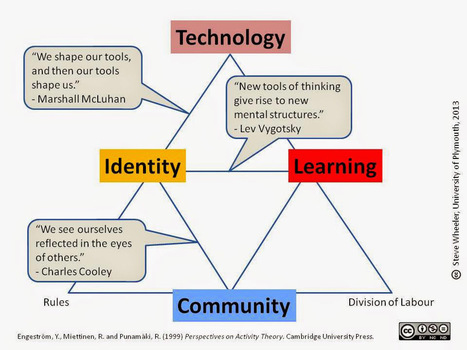 Your new post is loading...
 Your new post is loading...
If you want to hold brainstorms that unearth better, more creative ideas, it all starts with the number of people in the room. That’s my first tip for you: Follow the “pizza rule” for brainstorming. If you’re unfamiliar with the “pizza rule,” it’s the idea that if you have more people in a room than you could feed with a pizza, there are too many people in that room to hold a productive meeting. The same rule goes for a brainstorming session: If you’ve got a dozen people sitting around a table, expect a really long list of truly mediocre ideas. So, what else can you do other than bribe a group of two to six people with pizza to unearth good ideas? So glad you asked.
Via The Learning Factor
One of the most difficult transitions for leaders to make is the shift from doing to leading. As a new manager you can get away with holding on to work. Peers and bosses may even admire your willingness to keep “rolling up your sleeves” to execute tactical assignments. But as your responsibilities become more complex, the difference between an effective leader and a super-sized individual contributor with a leader’s title is painfully evident. In the short term you may have the stamina to get up earlier, stay later, and out-work the demands you face. But the inverse equation of shrinking resources and increasing demands will eventually catch up to you, and at that point how you involve others sets the ceiling of your leadership impact. The upper limit of what’s possible will increase only with each collaborator you empower to contribute their best work to your shared priorities. Likewise, your power decreases with every initiative you unnecessarily hold on to.
Via The Learning Factor
Ask the members of any team if they want to institute better processes, and be prepared for them to roll their eyes. “‘Better processes’ means ‘more bureaucracy,’” someone will mutter. But ask that same team how much they enjoy doing projects the hard way — duplicating efforts, scrambling to meet deadlines when someone drops the ball, or bearing the brunt of customer fury — and you can expect the floodgates to open. Why do people love to hate “process” but rail against disorganization? It is because most people associate processes with checklists, forms, and rules — the overseer breathing down their necks. Not surprisingly, leaders wanting to foster innovation and creativity are reluctant to institute such rigid controls and procedures.
Via The Learning Factor
It’s hard to get anything done with all of the push notifications pulling us into other directions. You can find something else to do or think about at any given moment. But maybe the distractions aren’t the problem. Maybe it’s your willingness to be distracted that needs to be examined. “Distractions are by-products of a problem,” says Kyle Cease, author of I Hope I Screw This Up: How Falling In Love With Your Fears Can Change the World. “Something outside of you is pulling you away from yourself or a goal. But the distraction is actually on the inside, and what’s going on outside matches what’s going on inside.” We invite distractions as a way to handle three internal struggles, says Cease.
Via The Learning Factor
Have you ever heard about someone “cutting the line” to land their dream job? They’re the people getting the perfect position without ever submitting a resume, or negotiating a sweet signing bonus plus five weeks’ vacation, or getting hired for a role the company created just for them. How do they do it? Are they just naturally golden? Or do they know something you don’t? While you might use the word lucky, these folks aren’t necessarily more talented; they’ve simply perfected a way of approaching the job search in a manner others haven’t been trained in (or are fearful of adopting). This out-of-the-box approach gives them a notable advantage when it comes to standing out. So what do they know, and how can you follow their lead to make your next transition not only more quickly, but more successfully as well? Do what they do:
Via The Learning Factor
The instructor of the world’s most popular MOOC explores how to change your life through the power of learning—and why you have more potential than you think.
Via Stefano Principato
Teddy Roosevelt did it. Harry Truman did it. Want to be an outstanding leader? Keep a leadership journal. As part of my executive coaching work, one of the most effective tools I recommend that powers up the coaching process is a leadership journal. The exercise of leadership is not unlike a sport you play. When you review your actions in the field you learn what worked, what didn’t, and adjust along the way. Leadership guru Peter Drucker said: “ Follow effective action with quiet reflection. From the quiet reflection will come even more effective action. ”
Via The Learning Factor
We're already more than a week into January, but I'm still slowly working my way through all the "best of" year-end lists out there (there are so many of them!). Combing through these recommendations may be time-consuming, but it's worth the commitment, I've found, as sometimes you turn up an absolute gem you missed earlier in the year. Take the post titled "The Two Minutes It Takes to Read This Will Improve Your Writing Forever," by marketer Josh Spector, for example. As short as it is useful, the piece is one of the most recommended posts of 2016, Medium informs me. It's not hard to see why. Spector offers five dead-simple changes you can make to basically any piece of writing in a matter of seconds that will make it more forceful and compelling. We'd all enjoy reading a bit more if more writers followed his tips.
Via The Learning Factor
Around half the population of the United States woke up on Wednesday morning to enormous disappointment. In a stunning upset, Donald Trump defeated Hillary Clinton in the race for president, leaving Trump supporters elated and many Clinton backers devastated. But in my work as a coach, I've found that even the most crushing defeats can ultimately be channeled into energy for forging ahead. Regaining confidence is an uphill battle, and it takes a crowd—or at least two people, talking things out—to pull an someone out of a funk. Here's how it can be done.
Via The Learning Factor
How The Activity Learning Theory Works
Vygotsky’s earlier concept of mediation, which encompassed learning alongside others (Zone of Proximal Development) and through interaction with artifacts, was the basis for Engeström’s version of Activity Theory (known as Scandinavian Activity Theory). Engeström’s approach was to explain human thought processes not simply on the basis of the individual, but in the wider context of the individual’s interactions within the social world through artifacts, and specifically in situations where activities were being produced.
In Activity Theory people (actors) use external tools (e.g. hammer, computer, car) and internal tools (e.g. plans, cognitive maps) to achieve their goals. In the social world there are many artifacts, which are seen not only as objects, but also as things that are embedded within culture, with the result that every object has cultural and/or social significance.
Tools (which can limit or enable) can also be brought to bear on the mediation of social interaction, and they influence both the behavior of the actors (those who use the tools) and also the social structure within which the actors exist (the environment, tools, artifacts). For further reading, here is Engeström’s own overview of 3 Generations of Activity Theory development. The first figure shows Second Generation AT as it is usually presented in the literature.
Via Gust MEES
|
Are you a micromanager? You will probably say no. Maybe you self-deprecatingly call yourself a “control freak.” Or just “hands-on.” You just “care too much.” And it’s true: You do feel a certain need for a sense of control over your work. You are responsible, after all–perhaps more responsible than some of your coworkers or direct reports. You’re afraid of mistakes and believe that if something needs to be done well, you’d better do it yourself. But this isn’t just because you’re an “independent self-starter” who holds their work to a high standard. It might be that, too, but it’s probably also because you’re feeling stressed.
Via The Learning Factor
One of the most difficult transitions for leaders to make is the shift from doing to leading. As a new manager you can get away with holding on to work. Peers and bosses may even admire your willingness to keep “rolling up your sleeves” to execute tactical assignments. But as your responsibilities become more complex, the difference between an effective leader and a super-sized individual contributor with a leader’s title is painfully evident. In the short term you may have the stamina to get up earlier, stay later, and out-work the demands you face. But the inverse equation of shrinking resources and increasing demands will eventually catch up to you, and at that point how you involve others sets the ceiling of your leadership impact. The upper limit of what’s possible will increase only with each collaborator you empower to contribute their best work to your shared priorities. Likewise, your power decreases with every initiative you unnecessarily hold on to.
Via The Learning Factor
Getting smart people into your company is hard enough. Turning them all into great collaborators and risk-takers is even harder. Even on the most high-performing teams, coworkers don’t just openly share feedback and challenge each others’ ideas all on their own–managers need to create a culture that encourages this. And that usually requires building your team’s collective emotional intelligence. Here are a few straightforward (and entirely low-tech ways) to get started.
Via The Learning Factor
We call ourselves “human beings,” but I think that title is aspirational: one we are meant to earn. Being human should mean we are capable of higher-level thought and can choose rationally how we respond to external events as well as to internal thoughts and emotions. Now, I don’t know about you, but all I need is to be cut off in traffic or have my husband use the wrong tone of voice to witness my own inability to do this well. Perhaps the most surprising element in business today is that we often behave in ways that are extremely ineffective and quite beneath us. Even those among us who are highly educated senior-level professionals fall into these traps.
Via The Learning Factor
Teacher professional learning is of increasing interest as one way to support the increasingly complex skills students need to learn in preparation for further education and work in the 21st century. Sophisticated forms of teaching are needed to develop student competencies such as deep mastery of challenging content, critical thinking, complex problem-solving, effective communication and collaboration, and self-direction. In turn, effective professional development (PD) is needed to help teachers learn and refine the pedagogies required to teach these skills. However, research has shown that many PD initiatives appear ineffective in supporting changes in teacher practices and student learning. Accordingly, we set out to discover the features of effective PD. This paper reviews 35 methodologically rigorous studies that have demonstrated a positive link between teacher professional development, teaching practices, and student outcomes. We identify the features of these approaches and offer rich descriptions of these models to inform those seeking to understand the nature of the initiatives. Learn more / En savoir plus / Mehr erfahren: https://gustmees.wordpress.com/?s=coaching https://gustmees.wordpress.com/?s=professional+development
Via Gust MEES
Teddy Roosevelt did it. Harry Truman did it. Want to be an outstanding leader? Keep a leadership journal. As part of my executive coaching work, one of the most effective tools I recommend that powers up the coaching process is a leadership journal. The exercise of leadership is not unlike a sport you play. When you review your actions in the field you learn what worked, what didn’t, and adjust along the way. Leadership guru Peter Drucker said: “ Follow effective action with quiet reflection. From the quiet reflection will come even more effective action. ”
Via The Learning Factor, Kevin Watson, Bobby Dillard
La compassion n’est pas un sentiment que l’on s’attendrait à trouver dans le monde parfois sans pitié de l’entreprise. Et pourtant, elle pourrait être la première vertu du dirigeant. Les dirigeants qui font preuve de compassion envers leurs employés favorisent la résilience individuelle et collective dans les périodes de changement, selon le …
Via JP Fourcade, François Pellerin
Resolutions are often an exercise in wishful thinking. People rarely keep them, mostly because they’re vague about their goals and don’t have a plan for following through. But that isn't the only thing that may weaken resolve or slow progress toward a goal. Failing to understand some practical brain science can just as quickly do you in. Neuroscience has shown us this year that we may actually have everything we need to stay focused, be more creative, remember more, and make better decisions—just as long as we can work a bit more with our brains, not against them. Here are a few things we learned that can take you closer toward being your best self in 2017.
Via The Learning Factor
Reportez-vous régulièrement votre travail à plus tard ? Cela vous est-il ou non bénéfique ? Que ressentez-vous dans pareille situation ? Comment modifier ce comportement ? Qu’est-ce que la procrastination ? Il s’agit d’un comportement que l’on adopte dans le but d’éviter la réalisation de tâches considérées comme dérangeantes, voire pénibles. Un conflit intérieur nous dicte, consciemment ou non, … Continuer la lecture de C’est décidé ! J’arrête de procrastiner →
Via Susan Leene
|



 Your new post is loading...
Your new post is loading...








































As a High D/I on the DiSC model I've always loved a good brainstorming session. Nice little article to get you thinking and perhaps change things up a little in the boardroom. Also check out Edward De Bono's 6 Thinking Hats book - fast and effective way to problem solve involving brainstorming that you might also like to read. Have a great week ahead.
Squashing bad ideas could lead people to fear speaking up, missing out on good ideas as a result. But if you’re giving every idea equal due regardless of merit, then you get off-track real fast and end up down a bad idea rabbit hole.